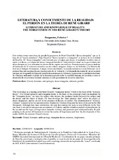Mostrar el registro sencillo del ítem
Literatura y Conocimiento de la Realidad: El Perdón en la Teoría de René Girard
| dc.rights.license | http://creativecommons.org/licenses/by-nc-sa/3.0/ve/ | |
| dc.contributor.author | Bergamino, Federica | |
| dc.date.accessioned | 2016-09-27T16:26:06Z | |
| dc.date.available | 2016-09-27T16:26:06Z | |
| dc.date.issued | 2016 | |
| dc.identifier.issn | 1690-3226 | |
| dc.identifier.uri | http://www.saber.ula.ve/handle/123456789/42369 | |
| dc.description.abstract | Este trabajo toma como base de partida la propuesta de René Girard del “deseo triangular” que es la base de su “teoría mimética”. Para Girard el “deseo imitativo y triangular” es la base de la rivalidad del hombre. El “deseo triangular” está formado por: el sujeto que desea, el mediador-modelo entre el sujeto y el deseo, y el objeto del deseo. Luego desarrolla la “idea mimético-dual” en la que el objeto del deseo desaparece y se enfrentan los deseos de los sujetos en conflicto.Posteriormente se pasa a analizar el fenómeno de la violencia mimética en dos relatos antiguos: Edipo rey de Sófocles y la Historia de José en el Antiguo Testamento. Aunque tienen similitudes, la mirada narrativa es muy diferente: en el primero hay una aceptación casi inconsciente de la violencia y la búsqueda incesante de un ser a quien castigar; en el segundo la lógica del perdón desenmascara la violencia y genera nueva realidad relacional. Se concluye indicando el poder de la literatura para desvelar la realidad humana del perdón y como el desarrollo de esta misma realidad culmina el ciclo girardiano de la teoría mimética | es_VE |
| dc.language.iso | es | es_VE |
| dc.rights | info:eu-repo/semantics/openAccess | |
| dc.subject | Girard | es_VE |
| dc.subject | Literatura | es_VE |
| dc.subject | Antropología | es_VE |
| dc.subject | Deseo Triangular | es_VE |
| dc.subject | Mímesis | es_VE |
| dc.subject | Perdón | es_VE |
| dc.title | Literatura y Conocimiento de la Realidad: El Perdón en la Teoría de René Girard | es_VE |
| dc.title.alternative | Literature and Knowledge of Reality: The Forgiveness in the René Girard’s Theory | es_VE |
| dc.type | info:eu-repo/semantics/article | |
| dc.description.abstract1 | This work takes as a starting point René Girard’s “triangular desire” which is the basis of his “mimetic theory”. For Girard imitative and triangular desire is the basis of the proposal rivalry in mankind. In the “triangular desire” we have the subject who desires, the mediator-model between the subject and the desire, and the object of desire. He then develops the “dual mimetic idea” where the object of desire disappears, and we are left in the presence of desires in conflict. The phenomenon of “mimetic violence” is analyzed in two ancient stories: Sophocles’ Oedipus King and the story of Joseph in the Old Testament. Although they have similarities, the way they narrate the story is very different: in the first one there is an almost unconscious acceptance of violence and the relentless pursuit of punishment; in the second one the logic of forgiveness unmasks violence and generates new relational reality. It ends pointing to the power of literature to reveal the reality of forgiveness and how the development of this reality fulfills the mimetic Girard’s theory | es_VE |
| dc.description.colacion | 20-30 | es_VE |
| dc.description.email | bergamino@pusc.it | es_VE |
| dc.description.frecuencia | Semestral | |
| dc.identifier.eissn | 2244 - 842X | |
| dc.subject.facultad | Núcleo Rafael Rangel (NURR) | es_VE |
| dc.subject.institucion | Universidad de Los Andes | es_VE |
| dc.subject.keywords | Girard | es_VE |
| dc.subject.keywords | Literature | es_VE |
| dc.subject.keywords | Anthropology | es_VE |
| dc.subject.keywords | Triangular desire | es_VE |
| dc.subject.keywords | mimesis | es_VE |
| dc.subject.keywords | forgiveness | es_VE |
| dc.subject.pais | Venezuela | |
| dc.subject.publicacionelectronica | Academia | |
| dc.subject.thematiccategory | Artes y Humanidades | es_VE |
| dc.subject.tipo | Revistas | es_VE |
| dc.type.media | Texto | es_VE |


